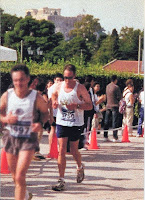
The distance from the little town of Marathon to Athens is exactly 26.2 miles. I watched my son finish that run in November of 2002 with the music of Vangelis' "Chariots of Fire" playing over the audio system in the stadium. The runners were carrying olive branches. I actually elbowed somebody so I could get a picture of my son finishing the marathon with the Parthenon in the background. I pressed and kept the part of that olive branch he gave me.
Watching the Beijing Olympics marathons on television this week told me a great deal about keeping on keeping on. Unless you yourself ran a marathon backwards so that you could see the other runners, you would never get this kind of documentation of a long-distance race. The runners' eyes are far away. They don't even seem to be running very fast. Sometimes they are companionable, passing water bottles back and forth, trotting side by side. They don't even seem very competitive until the very end of the race, though they quickly separate into a lead pack and a chase pack.
After months or even years of training, experimentation, trials, injuries, recoveries, timing, after carbo-loading, hydrating, choosing the right shoes and hoping for a cool day, they go through a two to four hour drama with hardly any idea of how it will come out. It is dangerous, too. Although my son assured me that the original historic marathon runner did not really die, someone did die at this year's San Francisco marathon. Many of the runners at the Olympics did not finish the race. There were ambulances. Glycogen depletion can make the muscles stop functioning entirely. Once the runner reaches this point, there is nothing he or she can do but stop. An important part of preparation seems to be estimating how much food and water and what kind will provide just enough energy for the particular temperature and track involved in the run.
Because the runners have special chips in their shoes, it is sometimes possible to follow the progress of a particular runner at your computer, miles away. I have had some bad moments when I was watching the computer screen to see how my son was doing in the Boston marathon...and then results abruptly stopped appearing.
All kinds of things happen to marathoners. Their toenails might come off. A friend told me of a woman marathoner who just gave up trying to keep toenails and started polishing her naked toes. Their nipples are abraded by their shirts. They throw up. They get diarrhea. Salt cakes on their bodies. They strain and pull important tendons and muscles. They get foot injuries and joint problems and shin splints and stress fractures. Some runners limp to the finish line. It may take days to recover from a marathon.
On the other hand, there are statistics showing that runners tend to live longer and stay healthy longer than non-runners. They have slow, powerful heartbeats and lean animal bodies.
In Beijing, the Kenyan front-runner jogged along easily for 20 miles and than ran as if he were being pursued by wild animals, setting a new world record of two hours, six minutes and a few seconds. Kenyans almost always win marathons, though a Romanian woman got the gold medal in the women's race.
Why do they do it? Olympians, of course, are there to win, to break records, to make their country proud, to get fame and glory and lots of money endorsing products. But local non-Olympic marathons are another matter entirely. Marathon prizes are provided by hundreds and thousands of the slowest runners, who pay a fee to enter the race without a hope of winning it. "I get my best ideas when I'm running," my son says. "Once you get the machine going, you are absolutely free."
I can almost imagine what this is like. For two hours or more, the runners are like birds riding the thermals, watching the scenery, correcting their pace, thinking their thoughts, eating their power bars, accepting an orange slice or a water bottle from the cheering people who line the route. Look at their faces. Until the final push, the faces of distance runners are as placid and serene as those of Zen masters.
Someone interviewed a 91-year-old man who ran the classic marathon in Greece in 2002. It took him a very long time. He managed to walk or run almost the entire course, but had to be hauled across the finish line by his friends. "Why did you do it?" the interviewer asked. And the old fellow answered "Why, for love, of course."

No comments:
Post a Comment